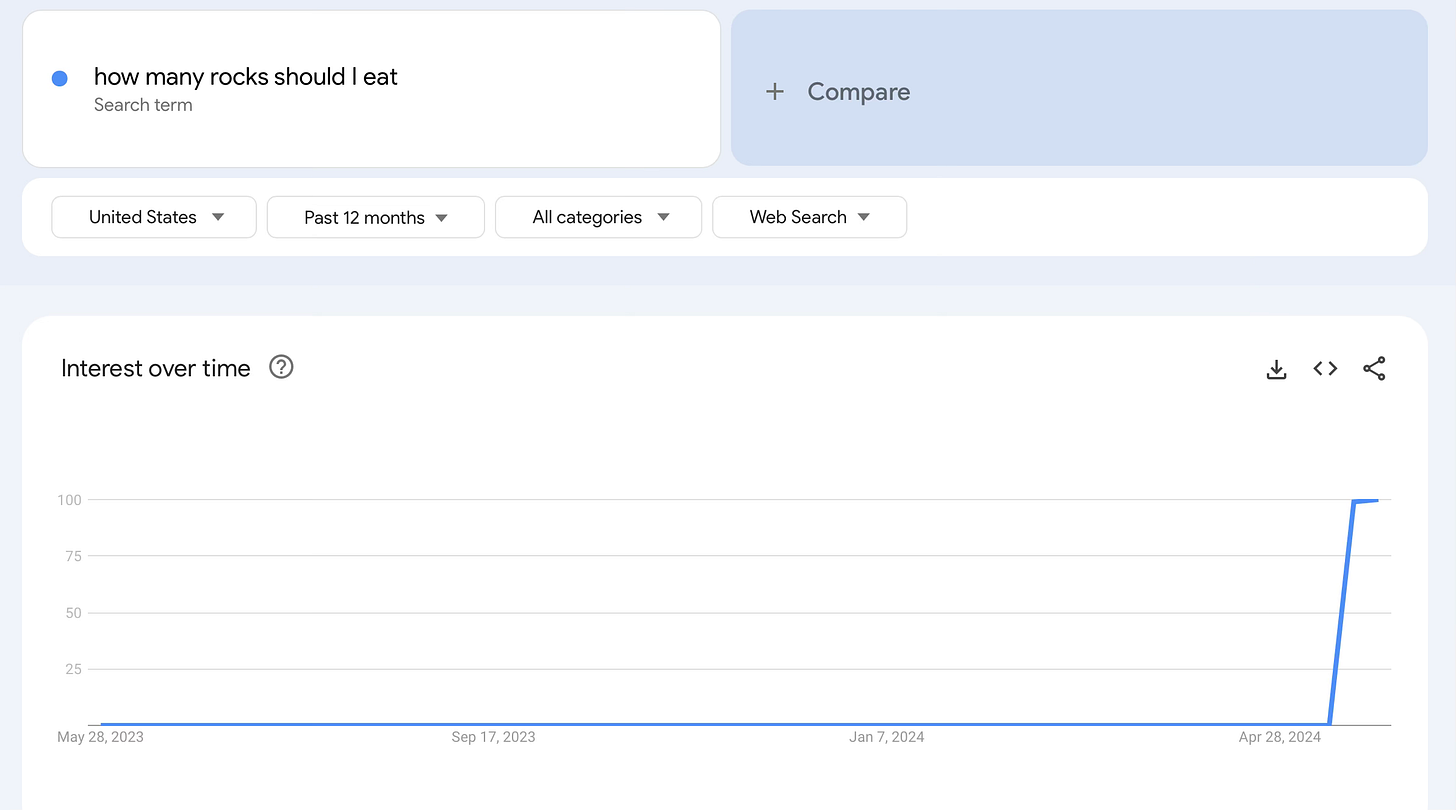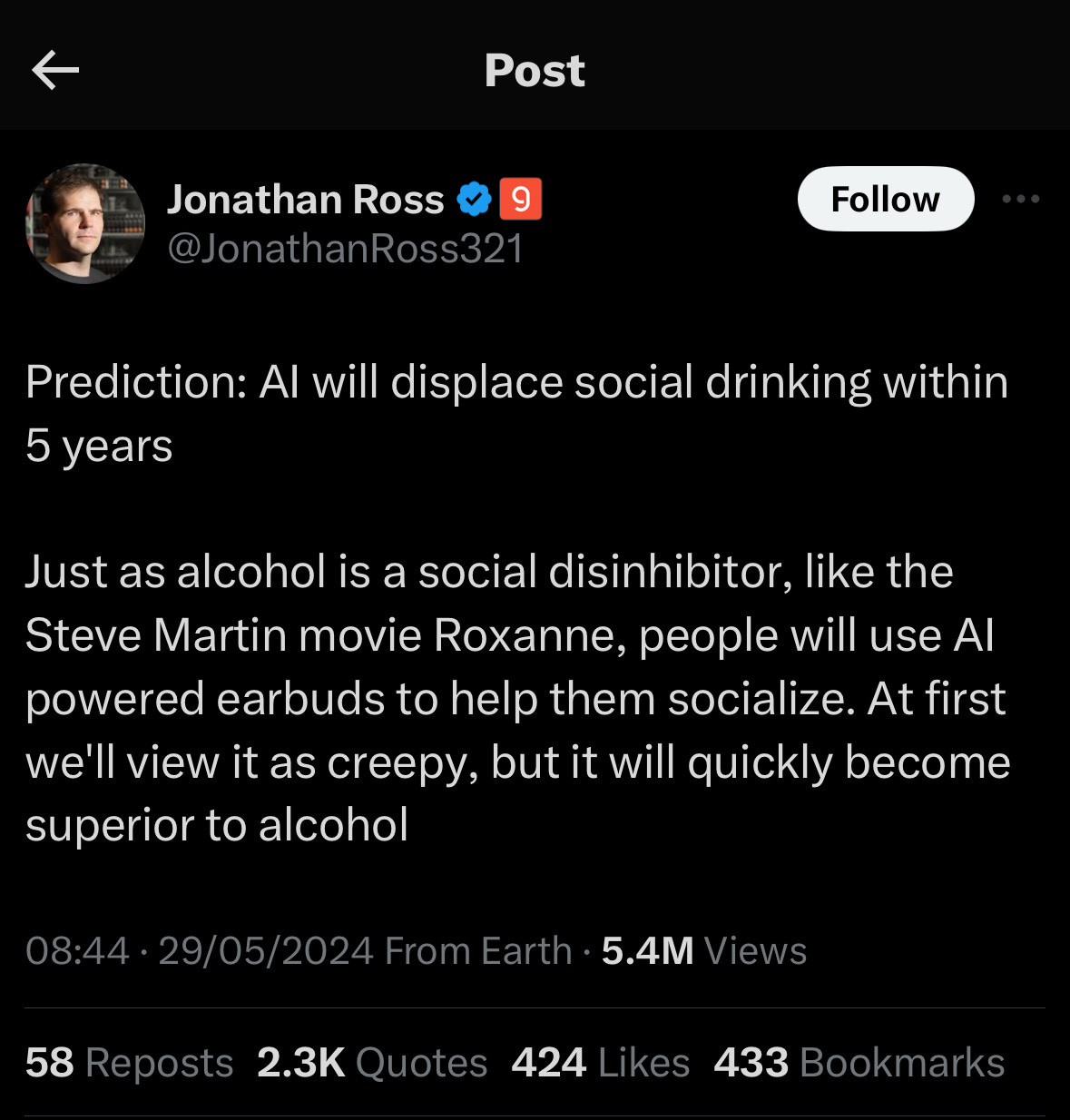It's not artists who should fear AI
AI might be an extinction-level threat, but not in the way we think
As artists, we’ve been living in a state of perpetual fear and uncertainty since 2022.
Sorry, I meant since 1422. Maybe earlier. But that constant sensation of being an endangered species intensified dramatically in 2022 with the arrival of generative AI.
Hey! they shouted from the rooftops, anyone can write a novel now!
Anybody can be an artist!
You don’t even need any skill!
Forget about the process! It’s all about the product!
More content! Democratised content!

Immediately, Hollywood execs were plotting how to cut writers out of the filmmaking process. Immediately, producers were thinking of ways to synthesise actors’ voices and likenesses, to avoid having to work with actual humans. Extras could be paid once for the creation of a digital avatar, which could be re-used endlessly for free. Why bother hiring journalists when you can generate articles and populate your ad-ridden site with optimised copy? Accuracy doesn’t matter as long as it’s getting the clicks. Don’t bother consulting the journalists or editors, though, as they’ll just kick up a fuss — publish it and apologise later. Forget about illustrators for the covers of books or the pictures on collectible cards — we can generate it all for free,1 and it’ll look just like Frank Franzetta painted it. And he’s dead!
Oh, and here’s an even better idea. Let’s shoehorn AI into every technological crevice we can find. You know, the way mould grows insidiously in cracks in the pavement, or on the damp walls of your poorly ventilated bathroom. Google can incorporate it into search results, because AI is more important to shareholders than accuracy, even if it recommends people jump off bridges to cure depression. Quick, Microsoft! Get it into every part of Windows as soon as possible. Make it pop up whether you want it or not. It’s the dream of Clippy, realised for the 21st century! Imagine Clippy but he could be your actual friend. Why not record everything someone does on their computer and load it into the AI model? Never mind security and privacy — this is about AI, and AI takes precedence over all things, including sense.
Build it into earphones, complete with cameras, so that the AI knows where you are and what you’re doing at all times. Have it advise you on your social interactions. It can be your taste-maker, your decision-maker, your life guide and companion. Fuck humans, who needs them?
We don’t even need to bother watching the movies that are being AI generated. We can have AIs to watch the generated movies. It’ll be perfectly optimised. A Moebius strip of content.
Disrupt, disrupt, disrupt. Content, content, content. Machines First!
Creators are annoying. They’re expensive and picky and have a tendency to wokeness. Imagine the world without any creators. The post-creation era! In the generative AI epoch anyone can create anything at any time, without needing other people. Production of songs and music and literature and games will no longer be difficult and expensive and require leadership and vision. At long last, people with no experience or talent can make the content they’ve always dreamed of. It’s the democratisation of thought!
Nobody will need to do anything. You can just enter a prompt into a computer on your sixth birthday and the AI will simulate the rest of your life for you. You can hit the randomise button to keep trying something different. You never get to do any of it, you just witness it. Rolling and rerolling the RPG of your own life. Live a hundred thrilling lives, from the comfort of your chair.
It’s the executive’s ultimate dream. The perfect, optimised society . Managers,2 those disciples to metrics and growth, will finally attain nirvana. It’s a religion in which the iconography is not the cross but an upward trending curve.
Deep breath.
I don’t think it’s going to go the way they expect.
The tech bro’s self-obliteration
All the attention is on generative AI and its impact on creative industries. Painting, illustration, storytelling, copywriting, design, coding, music, video.
Thing is, it’s not very good at any of those things. Over time, it will probably become better. But that doesn’t really matter, because all of those things are only interesting when they’re filtered through the unique perspective of a conscious mind. For now, that means a human. It doesn’t matter how convincing LLMs become, they’re not going to be conscious, or have a point of view, or have true understanding.3
Even if you put that aside, though, there’s another factor: most humans have a compulsion to create. Whether that’s birthing a novel, or a painting, or a song, or a child, it’s the same impulse. We don’t do these things to make money, or find fame, but because we love the experience. Hell, most of these things are entirely illogical and have an immense cost, financially or mentally or physically, but we do them anyway because we can’t not do them.
The process of creation is the point, for the artist. The end result is useful for the reader/viewer/listener, but is far less important. The act of creation is the exciting bit, not the thing that is output. Once I’ve written a book and published it, I’m onto the next one. The writing of the book is the thrill for me. And the process, and its difficulty and unpredictable twists and turns, is what makes the finished product have value.
Creators aren’t going anywhere.
So:
We — the creators — absolutely will embrace AI tools and incorporate them into our wider, larger processes. AI tools will enable us to do exciting, new things that were previously impossible. But we’ll be judicious. The tools will serve us, and we’ll use them carefully and responsibly, to enhance the human experience rather than reduce it. Some people will choose to avoid AI tools altogether, just as many writers opt to write by hand, and painters choose real paint over a digital pen.
That is how it should have been from the beginning.
But the tech bros lacked the imagination and the foresight and the social conscience, and instead saw only capital and opportunity and power and metrics. It didn’t occur to them to consult with artists to shape generative AI’s development; instead they only thought to subvert and undermine. It is no surprise that they pursued such a strange direction; only the most creatively bankrupt would steal from the planet’s entire history of art and then use that data to try to extinguish the very act of creation itself.
But yeah, creators aren’t going anywhere.
AI is already quite good at some things. Pure data analysis, crunching vast quantities of information. Making some kind of sense of disorder. Easing and accelerating otherwise complex procedures. Streamlining bureaucratic necessities. What AI lacks in understanding and appreciation of context, it gains in raw computational analysis.
Once the gold rush ends and the bubble bursts, we’ll be left with the genuinely useful tools. The spreadsheet assistants to help us with our finances. The auto-accountants. The logistics engines to manage personnel, wages, inventory. Networking boosts to connect us with the right humans with the right skills, anywhere on the planet. All the things that have definitive answers.
When generative AI is used, it will be by individuals for personal use. Generative AI will be so easy that anyone can do it; which means there’s no market, no way to build supply and demand. Why would anyone buy into those products when they could simply roll their own? As always, the joy is in the creation: there might be some entertainment value in prompting the creation of the exact guilty-pleasure-popcorn-movie for the mood you’re in that evening; but that won’t diminish or remove the desire to watch human-crafted art the next night.
Meanwhile, in a sea of infinite content, readers and viewers and listeners and players will seek out the truly unique. The real market will be for the special books and games and films and music and [insert new thing that hasn’t been invented yet] that have passed through the brain of a sentient being and emerged as something the universe has never before seen.
When the dust settles, those who have cynically exploited workers and creatives for centuries will find that they’ve wiped out their own markets in a race to the bottom. Their own technology, pursued at such a rapid pace there was no time to pause to consider the consequences, will be their undoing. They’ve disrupted and innovated themselves out of existence. In a world of infinite, zero cost generative content, people will crave anything that is unique and human.
What will be left is instant self-serve AI generation, enjoyed by individuals for fun and novelty, and for which there will be no useful economy. The most useful AI tools will survive the bubble bursting, assisting doctors and experts and researchers, or aiding those who have immense skill in specific areas but no ability to write an invoice or a letter to a client.
All of this will likely take years.
The consolidated corporate channels and platforms and streams will be full of infinite, meaningless content, and as the subscriber interest dwindles, all the execs will panic. The accumulated distrust from their betrayals will foam up about their waists and the shareholders and CEOs will look up and shout “SAVE US!”
We’ll look down and whisper “No.”4
And there will remain the hard graft and earned creations of humans, where the experience of making the thing is paramount to its existence.
Thanks for reading.
I know this was a bit of a side quest compared to the usual Monday newsletter. This topic, whether we like it or not, is going to remain relevant throughout 2024 and beyond, and is worth exploring as artists: whether we like or loathe AI, use it or ignore it, or fall somewhere in the middle.
It’s been a while since I wrote about AI, partly because everybody else has been blathering on about it endlessly. There also didn’t seem to be much new to talk about — my stance from early 2023 remained the same and despite the rapid technical advances in 2022, everything had slowed down.
The main surprise is that generative AI has continued to exist in its odd place of being simultaneously remarkable and a bit crap. With each passing day the ‘remarkable’ diminishes and the ‘a bit crap’ becomes more glaring. Every mainstream application or integration has been either terrible or irrelevant. The economics seem a bit upside-down.
I’ve been enjoying reading
’s take, after first seeing him pop up on BBC News. Ed Zitron’s acerbic takedowns are entertainingly angry but always rooted in a careful analysis. I need to thank for some of the more absurd examples I mention in this piece — do follow him for more.The surprising thing is how quickly AI went from a ‘cool’ thing (albeit with many ethical / societal caveats right from the start) to a deeply ‘uncool’ thing. It’s the same sequence that happened with blockchain, NFTs and crypto: right at the start, everyone takes a look and thinks “huh, this is interesting and clever. Could be useful!" Then, over time, it becomes apparent that the tech is either not ready for use or is actually far less useful than it first appeared; all the normal people drift away to go do more interesting and important things, leaving only the weirdo tech evangelists, who proceed to turn it into a cult. This is where you end up when you let the worst people have the car keys.5
To bring all of this back to writing: for much of 2023 I had a lingering concern that the thing I most love to do could be under threat. Visual artists have had this since Midjourney and the other systems appeared in 2022, and the plagiarist scraping is more evident in visual mediums, too. I no longer really have that fear for three reasons:
Generative AI is still pretty bad by itself (though can arguably be used as a tool in a larger project)
Even if generative AI gets better, or a lot better, creative people will always have a need to be creative, and to seek out other creative people
There will always be people who want games, books, music, comics, films, [insert other thing] made by sentient beings who have something interesting to say
In other words, keep writing, keep painting, keep drawing, keep composing, keep designing.
And if you want to check out my human-made ongoing science fiction serial, Tales from the Triverse, you can find it here:
As long as you don’t count energy consumption. And farms of low paid workers having to sift through pornography and violent images to remove them from the dataset. Ignore all the costs and it’s totally free.
Yes, yes, #NotAllManagers etc
If AGI/superintelligence is achieved, with properly sentient minds that have understanding and a point of view on the world, then we’re into a very different debate entirely. I’ve not seen any evidence that this is going to happen anytime soon.
With apologies to Alan Moore.
To be clear, I’m referring here to the bosses at the corporations developing the systems, not artists who are experimenting with the tools.






Think you've set the correct acerbic tone for the many creatives amongst us. One of the issues to note which came up on a foresight exercise I participated in a while back is related to this scenario you flagged:
"The most useful AI tools will [be] assisting doctors and experts and researchers, or aiding those who have immense skill in specific areas..."
The problem here is that to reach the levels of expertise demanded of surgeons, lawyers, engineers etc requires years of training under the supervision of said experts. But if they begin to use AI assistants for reasons of cost, efficiency and availability, then there won't be any trainees coming up through the ranks to replace them. This means expertise degrading irrespective of long-term demand. It's not a great scenario.
The joy also used to be in the research. Apparently, according to Google, we can make do with an AI synopsis, which might or might not bear any relationship to primary materials or reality. This is a concerning business decision, a dumb decision.